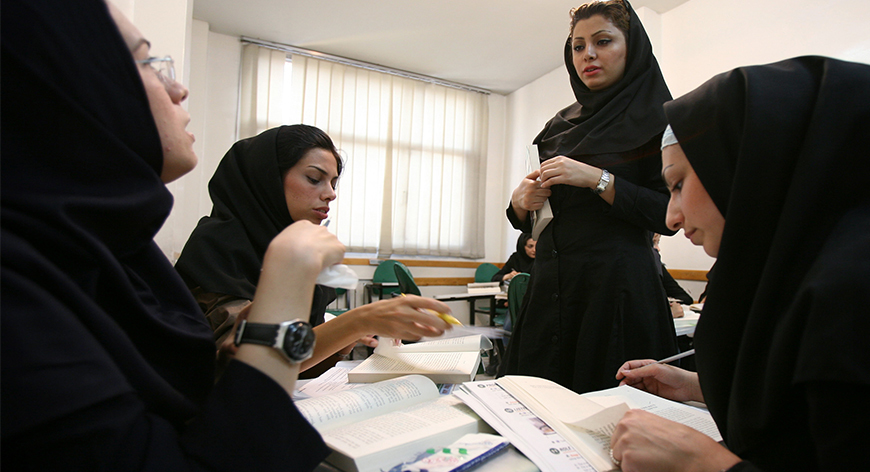The Iranian government is cracking down after a week of anti-government protests by pushing for a ban on teaching English in primary schools.
“The primary education program is to strengthen the Persian language and Iranian culture of the students, and teaching foreign languages is not recommended at all in the elementary period,” Iran’s secretary general of the High Council of Education, Mehdi Navid Adhem, told Iranian state TV and according to Kayhan, on January 7.
"Teaching English in government and non-government primary schools in official and informal school hours is prohibited, and such classes will be prevented,” Navid-Adham said.
In Iran, English is regarded as a gateway to new knowledge in areas like science, economics and literature, to help students develop functional communication skills, and to pass international tests. Primary education in Iran lasts six years, while middle and high school lasts another three years each. English classes begin in middle school, but some primary schools with younger pupils also offer English. In the official curriculum of public education, English is listed as one of the required courses for middle and high school levels.
Iran’s Deputy Education Minister Rezwan Hakimzade confirmed the ban, saying "this issue is not a new, and according to the approved curriculum, the teaching of the English language doesn't begin in primary schools," Iran’s Tabnak news website reported.
The announcement of the prohibition of English teaching comes after a week of anti-government riots, which broke out on December 28 and Iran accuses western countries, particularly the United States, of inciting. At least 21 protesters and two security force members have been killed, and about 1,000 demonstrators have been arrested over a one-week period.
In May 2016, during a speech to Iranian teachers, Iran’s Supreme Leader Ayatollah Ali Khamenei, criticized the practice of what he called the “insisting on the promotion of English [language] alone.” Iran’s Supreme Leader reiterated that “other countries have plans for countering the spread of foreign languages … [but] unfortunately in our country there is no specific plan for dealing with this issue and we have left the doors open for the spread of foreign culture,” according to Middle East Eye.
While some are blaming English-language instruction for the recent protests, others attribute the protests to social media and the internet, however.
During Friday prayers in Tehran, senior cleric Ahmad Khatami blamed popular international messaging apps like Instagram and Twitter for the unrest that accompanied days of protests over Iran’s waning economy. The government has already cut internet access to mobile phones, in order to prevent what it says are activities of “anti-revolution rioters”, and also warned the most popular social media service in the Iran, Telegram.
According to 2016 data provided by Internet Live Stats, about 50 percent of the Iranian population, representing over 39 million people, have access to the internet.
On January 5, four special rapporteurs from the Office of the United Nations High Commissioner for Human Rights urged the Iranian government to respect the rights of protesters and end its blocking of the internet.







 Azerbaijan and Armenia started the process of demarcation of their border on Tuesday, with the installation of the first border markers based on ge...
Azerbaijan and Armenia started the process of demarcation of their border on Tuesday, with the installation of the first border markers based on ge...
 President Aliyev emphasized the critical role of the North-South Transport Corridor in fostering transport cooperation between Azerbaijan and Russi...
President Aliyev emphasized the critical role of the North-South Transport Corridor in fostering transport cooperation between Azerbaijan and Russi...
 Armenian sappers commenced on Monday mine-clearance operations in the territories adjacent to the Saint Mary Church in village of Voskepar (Armenia...
Armenian sappers commenced on Monday mine-clearance operations in the territories adjacent to the Saint Mary Church in village of Voskepar (Armenia...
 Russian Foreign Minister Sergei Lavrov has reasserted that Moscow has no intentions to stop the fighting in Ukraine, even if peace talks commence.
Russian Foreign Minister Sergei Lavrov has reasserted that Moscow has no intentions to stop the fighting in Ukraine, even if peace talks commence.
 Iran and Pakistan have signed eight cooperation documents in various fields, and agreed to strengthen ties to fight terrorism in the region.
Iran and Pakistan have signed eight cooperation documents in various fields, and agreed to strengthen ties to fight terrorism in the region.



